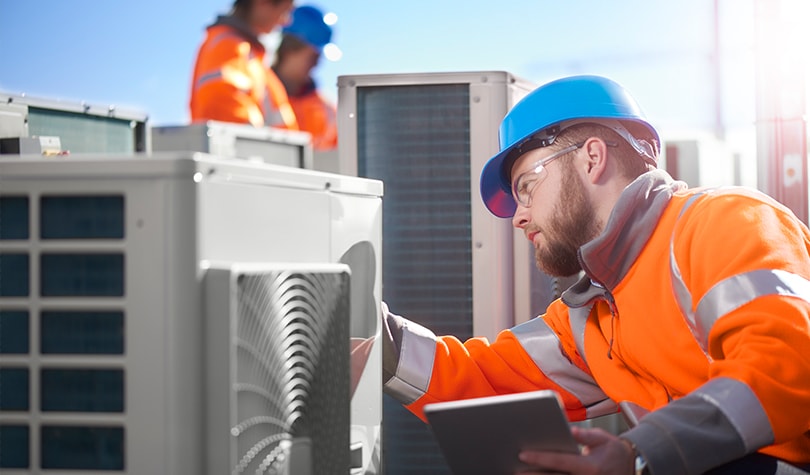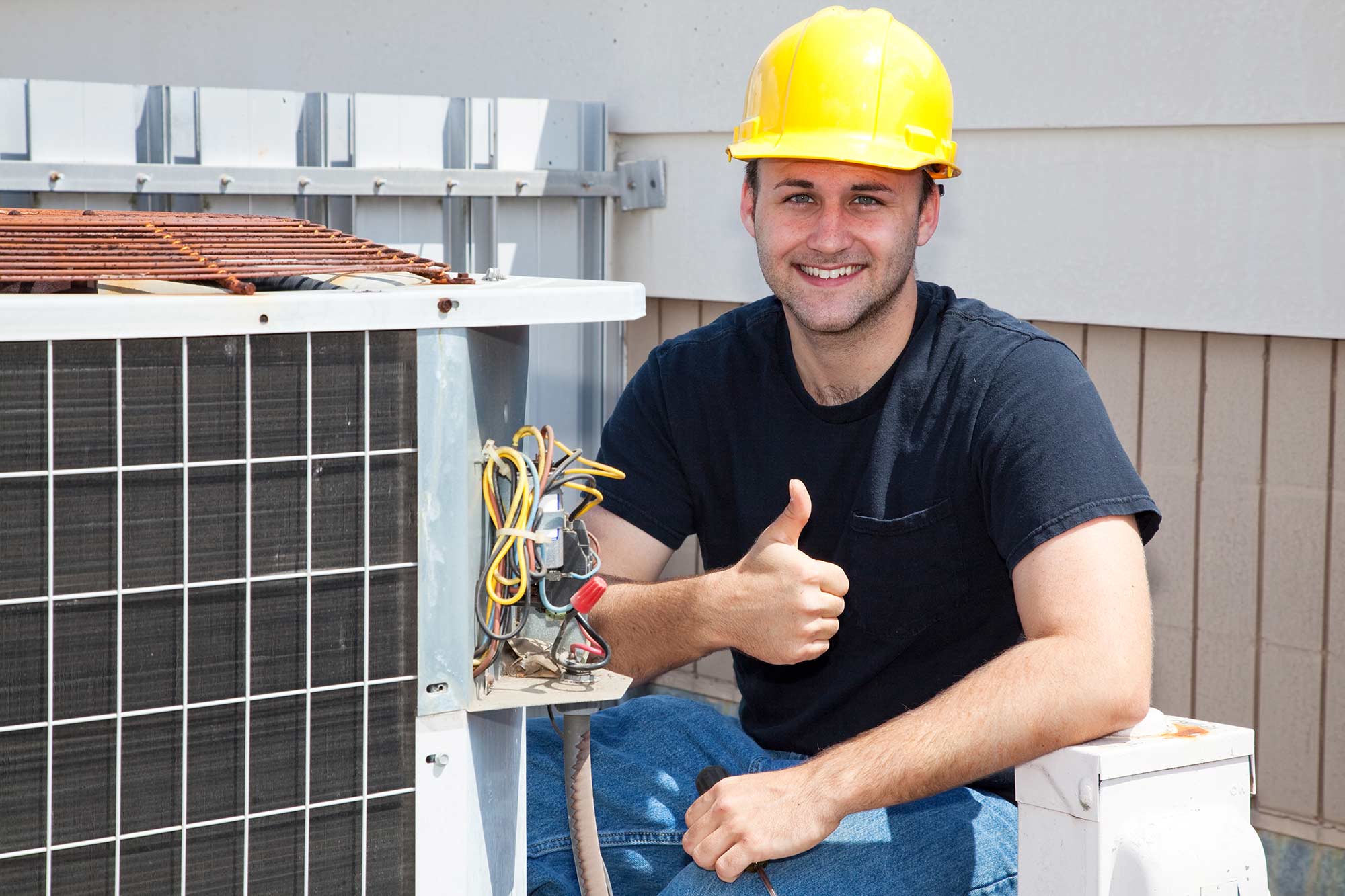HVAC company services explained: what homeowners should expect
Everything about HVAC: Identifying Common Issues and Effective Air Conditioning Repair Work Methods
A/c systems are essential for maintaining indoor convenience. Understanding their parts and functionality is important for recognizing common problems. Homeowners typically face issues such as ineffective cooling, unusual smells, or rising power expenses. These indications can indicate underlying problems that might need focus. Discovering DIY troubleshooting methods can be useful, however understanding when to seek professional aid is just as vital. What steps can be taken to assure resilient performance?
Recognizing Your A/c System: Parts and Performance
A heating and cooling system, often considered the backbone of indoor environment control, contains a number of key elements that function together to regulate temperature and air high quality. The primary aspects consist of the heating unit, air flow system, and cooling unit. The heating system, normally a furnace or central heating boiler, produces heat throughout chillier months, while the cooling device cools down interior spaces throughout the summertime.

Typical A/c Problems House Owners Experience
Homeowners typically face numerous typical cooling and heating troubles, consisting of inconsistent temperature circulation throughout their space. Additionally, uncommon sounds throughout procedure can show underlying concerns that require focus. Dealing with these worries immediately is crucial for maintaining perfect system efficiency.
Irregular Temperature Level Circulation
Numerous homes experience the discouraging problem of irregular temperature distribution, where particular spaces really feel annoyingly cozy while others remain also cold. This issue often occurs from a range of factors, consisting of poor insulation, obstructed vents, or a poorly sized a/c system. When air ducts are not sufficiently secured or when furnishings blocks air flow, some spaces might obtain not enough air conditioning. Additionally, thermostat placement can significantly impact temperature regulation; a thermostat located in a sunlit area might misrepresent the overall temperature level of your home. Normal maintenance, including cleansing filters and making sure ductwork is clear, can help minimize these disparities. Home owners may also take into consideration zoning systems to better control temperatures throughout different locations of the home, advertising a much more comfortable living environment.
Unusual Noises During Procedure
When a cooling and heating system runs, uncommon noises can show underlying issues that need focus. Home owners might come across a variety of audios, such as grinding, squeaking, or hissing. Grinding noises commonly signify damaged bearings or parts, while squeaking can suggest loosened belts or components requiring lubrication. Hissing might indicate a cooling agent leak, which can endanger the system's efficiency. Additionally, banging noises might indicate loosened ductwork or an issue with the blower fan. Each of these noises acts as a caution, motivating home owners to examine even more. Neglecting these indications can lead to more substantial issues and costly repairs. Routine upkeep and punctual interest to unusual noises can enhance system long life and efficiency, guaranteeing a comfy living atmosphere.
Indications That Indicate Your AC Needs Fixing
How can one tell if their a/c system is in requirement of repair? A number of indicators may indicate underlying problems needing specialist attention. Initially, if the AC falls short to cool down the area properly, it might recommend a refrigerant leak or compressor breakdown. Furthermore, an increase in power costs without matching use changes can signal ineffectiveness in the system. Homeowners need to additionally be sharp to uncommon smells emanating from the unit, which could suggest mold development or electrical problems. Additionally, if the air conditioner often cycles on and off, it could be an indication of a defective thermostat or various other mechanical issues. Ultimately, the existence of water merging around the device can show a blocked drain line. Identifying these indicators early can save money and time, ensuring that the air conditioning system runs successfully and efficiently.
DIY Troubleshooting Techniques for A/c Issues
When dealing with HVAC problems, house owners can use a number of do visit this site right here it yourself troubleshooting techniques to identify the trouble. Trick approaches consist of inspecting thermostat settings, checking air filters, and examining drain concerns. These steps can aid determine usual breakdowns prior to looking for specialist assistance.
Inspecting Thermostat Setups
What actions should house owners require to assure their thermostat setups are appropriate? They should confirm the thermostat is set to the desired temperature level and mode, whether heating or cooling. Looking for a clear screen and validating the thermostat is not established to "hold" or "vacation" mode is essential. Homeowners must likewise confirm that the thermostat is degree and set up in a place devoid of drafts, direct sunlight, or various other temperature level influences. In addition, recalibrating the thermostat can help provide precise analyses. If the thermostat runs on batteries, this contact form changing them may resolve any kind of issues. By systematically evaluating these aspects, property owners can usually recognize and rectify thermostat-related issues, advertising excellent cooling and heating system efficiency.
Inspecting Air Filters
Air filters play an important duty in preserving perfect heating and cooling performance. They catch dirt, irritants, and various other particles, guaranteeing clean air flow. With time, filters can become blocked, decreasing airflow and performance. To evaluate air filters, people must first situate the filter, typically found in the return duct or near the heater. As soon as situated, they should evaluate the filter's problem-- if it appears dirty or blemished, it likely requirements replacement. A lot of filters need changing every 1-3 months, depending upon usage and ecological factors. Normal examination and timely replacement of air filters not just boost air quality but additionally prolong the lifespan of heating and cooling systems, preventing possible breakdowns and pricey repairs.
Assessing Water Drainage Issues
How can homeowners properly identify and deal with drainage issues within their cooling and heating systems? Initially, they ought to check the condensate drainpipe line for clogs or obstructions, which can bring about water accumulation. Property owners may use a wet/dry vacuum cleaner to remove any kind of debris blocking the line. Next, checking the drain pan for rust or leakages is essential, as a harmed pan can cause water to overflow. Normal cleaning of the drain line with a mix of vinegar and water assists prevent future blockages. Furthermore, making certain proper incline of the drain line advertises effective water flow. If these do it yourself methods do not deal with the issue, consulting a specialist a/c professional might be necessary to prevent possible water damage and system failing.
When to Call a Specialist for AC Fixings

While some AC problems can be dealt with with do it yourself methods, there are circumstances where calling a specialist becomes vital. Property owners need to look for experienced assistance when they come across relentless issues, such as inadequate cooling, unusual noises, or uncommon odors emanating from the system. These signs and symptoms might indicate much deeper concerns that call for specialized understanding and devices to identify and fix properly.

Preventative Maintenance Tips for HVAC Longevity
Regular preventative maintenance can substantially improve the long life of a/c systems. Property owners should schedule annual assessments by licensed technicians to examine system efficiency and identify potential concerns. Routinely changing or cleaning air filters is essential, as this warranties proper air movement and minimizes strain on the system. On top of that, inspecting and securing ductwork stops energy loss and boosts overall performance.
It is additionally a good idea to keep the exterior device free from debris and plant life, permitting peak airflow and warm exchange. Homeowners need to examine the condensate drain for clogs to stay clear of water damage and mold and mildew growth. Preserving proper thermostat settings and making use of programmable options can boost energy effectiveness. Documenting maintenance tasks assists track solution background and can aid in identifying repeating issues. By following these preventative actions, individuals can maximize the effectiveness and life-span of their a/c systems
Often Asked Concerns
Exactly how Often Should I Replace My Cooling And Heating System Filters?
A/c system filters should usually be replaced every one to 3 months, depending upon use, filter type, and ecological aspects. Routine replacement assists maintain effectiveness and air high quality, ensuring peak system efficiency more information throughout the year.
What Dimension Heating And Cooling System Do I Need for My Home?
To determine the proper a/c system size for a home, one should think about square video, insulation top quality, and neighborhood environment. Consulting a specialist can help guarantee optimal efficiency and convenience for the specific living room.
Exist Eco-Friendly HVAC Options Available?
Yes, environment-friendly a/c alternatives are readily available, consisting of energy-efficient heatpump, solar-powered systems, and geothermal heating. These options lower energy consumption and environmental effect, promoting sustainability while keeping efficient climate control for residential and industrial areas.
Just How Can I Boost My cooling and heating System's Energy Effectiveness?
To improve a/c energy performance, one can routinely keep the system, seal air leaks, mount programmable thermostats, use energy-efficient filters, and assurance adequate insulation throughout the home to decrease power usage and enhance performance.

What Is the Typical Life-span of an A/c System?
The typical life expectancy of a HVAC system generally ranges from 15 to 25 years, depending upon variables such as maintenance, usage, and the quality of installment. Routine maintenance can considerably prolong its functional longevity.
Final thought
In recap, an extensive understanding of heating and cooling systems equips property owners to determine typical problems and address small issues successfully. Recognizing indicators of malfunction, employing DIY troubleshooting techniques, and prioritizing regular maintenance can improve system performance and effectiveness. Nevertheless, when confronted with intricate fixings, employing professional aid is crucial to assure safety and long life. By cultivating recognition and positive treatment, people can appreciate a comfy indoor setting while lessening unforeseen expenses associated with a/c failures.